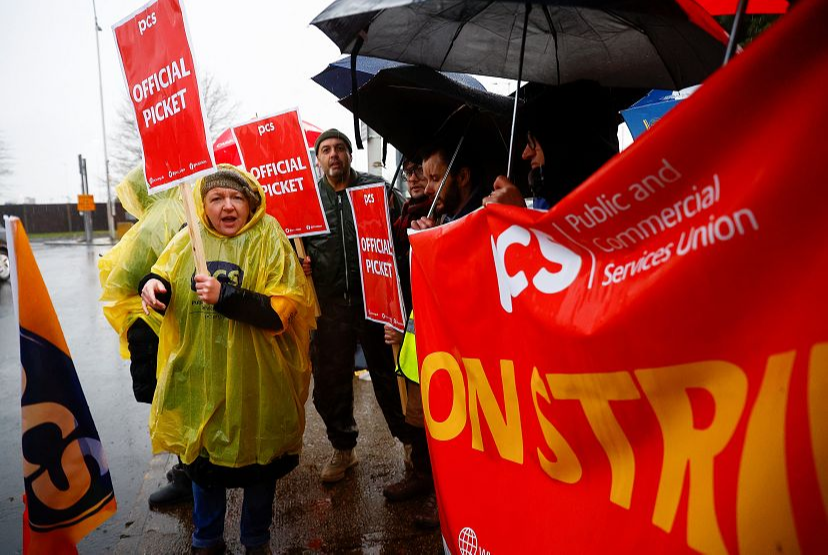
Members of the Public and Commercial Services (PCS) Union take part in a border force workers strike action near Heathrow Airport.REUTERS/Peter Nicholls
London, January 28 (RHC)-- Around 100,000 British civil servants have announced plans to strike this coming Wednesday, February 1st, the Public and Commercial Services (PCS) union has announced, in an escalation of a long-running dispute over pay and conditions.
The union members will take action across 124 government departments, affecting a range of public services including driving tests, passport applications, and welfare payments, the PCS said in a statement. It said a further 33,000 union members in five more government departments, including HMRC, were re-balloting next week to join the strike.
The date chosen by the PCS, February 1, coincides with the “protect the right to strike” day called on Tuesday by the Trade Unions Congress. That is meant to protest the government’s proposed minimum service levels legislation, which seeks to limit strike action in key industries.
Civil service unions, including the PCS, Prospect, and the FDA, for senior civil servants, will meet Cabinet Office ministers on Thursday as the government attempts to avoid further strike action. The unions have warned that the government will need to come up with a meaningful offer on pay and conditions if it wants to avoid industrial action.
Prime Minister Rishi Sunak’s government is already struggling to contain widespread industrial action across sectors including public transport, the National Health Service (NHS), and the Border Force, as unions protest against real-terms cuts in pay amid the fast rising cost of living.
The government has so far failed to stem the workforce unrest, despite a series of meetings between ministers and unions on Monday. About 14 healthcare unions representing more than one million workers said on Wednesday they would not engage in talks over pay for the next fiscal year until the government discusses this year’s pay settlement — something Sunak’s administration has said it won’t do.
During the past months, the UK has been grappling with its biggest strike wave for decades, with airport baggage handlers, border staff, driving instructors, bus drivers, and postal workers walking off their jobs to demand higher pay.
Nurses and ambulance workers are also locked in an intense dispute with the NHS as they seek payment raises to keep pace with soaring inflation, which stands at a record-high rate of about 11 percent.
The wave of paralyzing strikes came after the workers’ demands for a pay increase were rejected by the government, as the government has offered civil servants a 2%-to-3% pay raise and says it cannot afford high increases that match the soaring inflation, and even if it could, such monetary increases would further fuel inflation.
In reaction to the dispute, the government is set to unveil strike legislation in the near future to contain industrial actions in its key sectors, forcing the staff to maintain a basic level of services during strike time or face dismissal.

